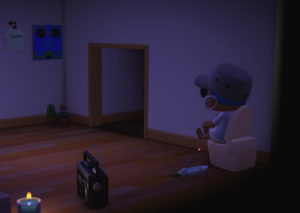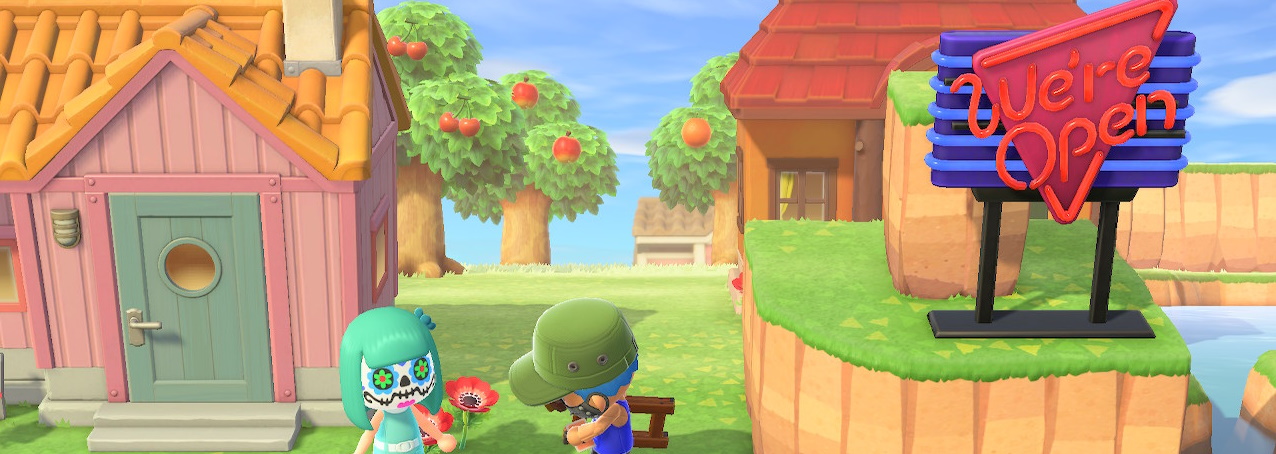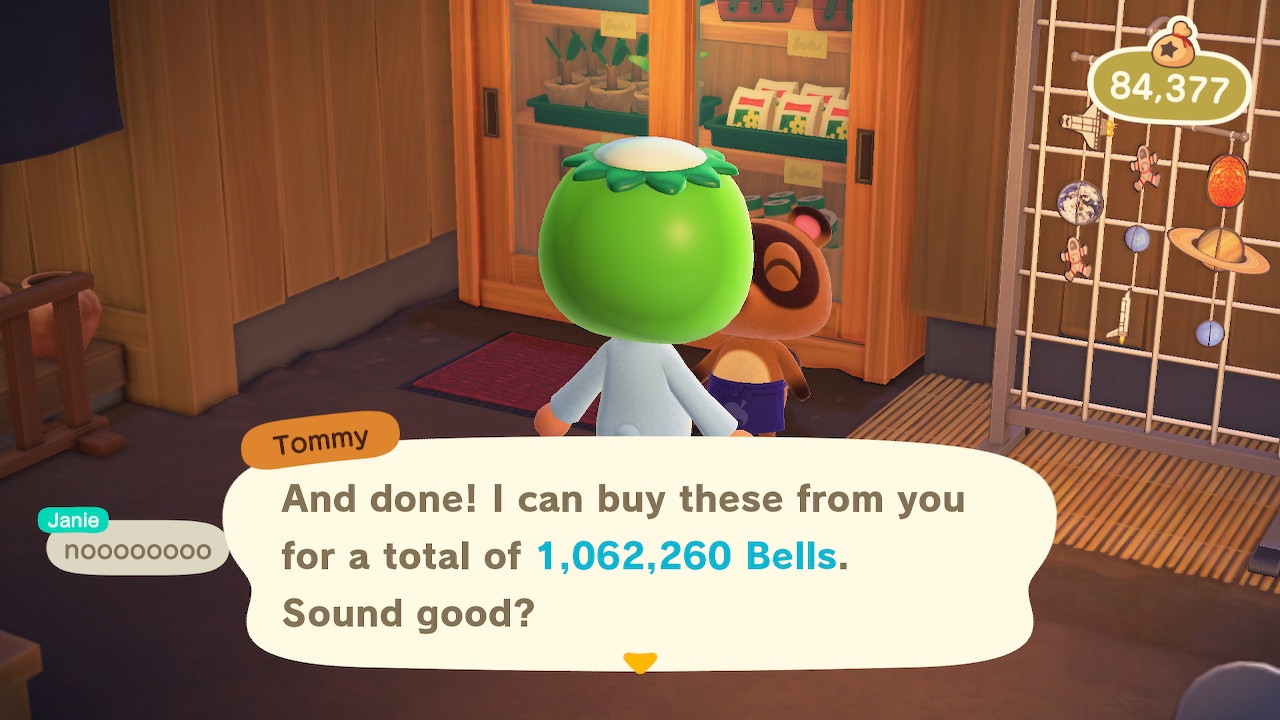
By now you all know that Animal Crossing: New Horizons is a thing. A popular thing, one that’s been invading your feeds, your Discords, your MMO sites (sorry not sorry), credit posts, and even basic news. It seems like it came out of nowhere, especially for non-gamers. This is false, and I feel like most coverage misses the mark when discussing the community surrounding the newest game in the series because, to be honest, many of them already conceptually existed.
Listing turnip prices and asking for entrance fees? I visited them in Animal Crossing: City Folk. Nookazon? Used similar services in past Animal Crossings. Giveaways? Same. Streaming the game and social media coverage? Had it, subbed it, even wrote for other outlets on it. For several generations now, the Animal Crossing series has been quite the creative online multiplayer game. While some people might have you thinking shelter in place is the cause of the game reaching the tippy tops of the revenue charts, I think this might only be a fraction of what’s really gone on: Nintendo, with the Switch, is finally being more friendly with social media and multiplayer accessibility, for good or ill.
The MMO-ness test
Let’s start with talking about how “MMO” the game is, since especially on this site, it’s something that people consider. We’ll use the criteria I’ve used in the past when describing other online multiplayer games:
- Avatar-based (text, 2-D, 3-D, etc.)
- Environment is persistent and interactive
- Environment leads to player-to-player interaction
- AI exists to interact with
- Some sort of reward system
- Corporate, not private, servers that don’t require or display a population size to start or cap out at
- Real-time interaction (for turn-based action, must be limited to seconds/minutes)
- In-game communication system
We’ve got avatars, the environment is both persistent and interactive, and it certainly has led to player-to-player interaction (trading goods, services, and just socializing). We interact with AI, there’s a reward system, there’s real-time interaction, and there’s an in-game communication system. That’s a 7 out of 8 features, though the one it’s lacking is servers that don’t require or display a population size to start or cap out. So Animal Crossing is much more an MMO than a lobby shooter (something like Overwatch lacks persistent environments and I’d argue no AI in most battle modes), but you clearly aren’t going to have a town able to compete with Orgrimmar in WoW.
That being said, the beauty of online multiplayer games, especially popular ones, is that even if you can’t play with all your friends at the same time, you can play with some of them whenever you’re simultaneously free, often without jumping through too many hoops to be on the same server or same zone. I think it’s one of the things that draw us to games like Phantasy Star Online or Monster Hunter. However, unlike those games, Animal Crossing has no direct combat, so social systems are at its multiplayer core, and they’re part of why the game is popular – just not quite in the way other people are covering it.
The ease of the Switch
One thing that simmers below the surface when I read coverage about this game is that the Animal Crossing series has had large, online communities for quite awhile. Starting with four-player online as part of the game experience in the 2005/6 game Animal Crossing Wild World for the Nintendo DS, as in many Nintendo games, online play was incredibly strict. The series has never allowed random visitors, but Nintendo games (and consoles) often asked the player to enter friend codes for specific games, not (just) their console. In other words, if you wanted to play Pokemon Diamond with a friend and then switch over to Animal Crossing, you’d need two different codes. And of course, the internet connections weren’t as good, so disconnects that resulted in lost progress were a major factor for inhibiting multiplayer.
Fast forward to the Nintendo Switch. While there are still console friend codes on the Switch, you can also add friends who have connected a Nintendo ID account to Facebook or Twitter. In fact, the account is connected to previous generation Nintendo consoles and mobile games that also use the Nintendo ID. This makes playing with friends (and finding out who just got a Switch for this game) significantly easier, both for people jumping on the Animal Crossing bandwagon as well for the people learning to deal with Nintendo’s traditional online hurdles, many of which have been noticeably reduced since the past generation.
Even easier now is the Dodo Code method, allowing people you’ve never played with or friended to visit you by inserting a 5-digit code. As New Horizons at least protects your town from shovels and axes, that’s pretty important. While visitors still pose a risk by destroying flowers (but no longer the entire plants) or taking things off the ground (such as turnips you might be storing), you do have some peace of mind where you didn’t previously.
And those turnip sites, delivery sites, giveaways, and so on? Those felt much more risky in past games. It’s not just that Animal Crossing lacks a trade window; it’s that trade involves opening your home to someone. Imagine old Animal Crossing games as a bit like the Wild West, where guns were everyday necessities and neighbors and lawmen might be miles away. You might think you’re getting an expensive piece of furniture for a steal, but actually the delivery boy is there to take your money and run. Maybe you AFK too long and a guest wanders by some rare flowers that took you a month to cross-breed and grow, but she takes them and runs, forcing your game to save. There was no option to simply roll it all back because, again, this is a persistent environment to an extent. You can change the date and time, but not your inventory (at least not without hacking, and don’t let Papa Mario catch you doing that because Big N doesn’t take it lightly).
It’s a big change. In the New Horizons experience, random delivery people might be able to pick your pocket so to speak (well, just stuff off the ground or in trees), but at least you’re not going to get shot. Social media connections do mean you can potentially complain about someone to a broader audience, but that also means your warning is easier to miss, and that’s one issue brought on by the social media enhancement.
Old problems, new tech, similar results
One thing that Nintendo’s been much better at is making the social media features easier to use on the Switch than on previous consoles. It allows for sharing of images and video clips complete with hashtags so even your tech-inept family members can participate. The Switch also plays more nicely with streaming tools than the previous generation games, which at this point are quite old, having released eight years ago. Turnip calculators, sharing designs, sharing town tunes – all of this isn’t that new, but it’s much easier to share and put someplace even non-gamers can find them.
As we all know, gaming fan sites are often the blood of gaming communities, even these days. Many guilds still have at least voice chat of some sort, maybe even an external site. Old-school Animal Crossing was very much the same, having communities on gaming sites like GameFAQs and dedicated series sites like Animal Crossing Community and The Bell Tree Forums. While these communities were more niche and harder for non-gamers to discover, they did make it a bit easier to police the community. For example, if I needed flowers, I knew Hybrid Heaven from ACC was an upstanding, trusted community that would take my complaints seriously if a delivery person harmed my town.
That isn’t to imply the new social media connections are bad or even poor quality. I’ve found some lovely people to play with and even invited them to my “neighborhood” (what a few of MMO Animal Crossing fans I’ve played with for years have referred to in place of a guild). The thing is, I also know what to look out for. Veteran players connected to fansites have already been tackling many of these issues for generations. New specialty sites, advertised through social media, are similar to old solutions, though often just have more visual presentation than the written instructions on forums posts vets previously relied on.
Nookazon is simple enough in concept: Amazon or eBay for Animal Crossing. In fact, it’s basically been done by groups like the previously mentioned Hybrid Heaven, but instead of filling out a forum post, you have something like a virtual catalogue. The catchy name, UI, and Discord integration makes it easier for non-veterans to jump in. It’s a good improvement in the same ways NH has iterated on the past.
 That being said, while it replaces the somewhat cumbersome analog approaches AC vets handled for years, it lacks the history of older communities. Working with a previously established community could have helped distinguished veterans and given new players a few faces to trust. For example, ACC had user ratings for your fellow neighbors that gave site users somewhat of an idea of how trustworthy someone was. Turnip.Exchange, another new community we recently mentioned, could have joined forces with ACC to help solve that issue. Instead, as some people have seen, there are people out to waste your time, and there’s little to nothing you can do about it, assuming they don’t outright steal from you. There are no numbers I know of to compare incidents but, well, my social media feeds weren’t filled with fake and fraudulent turnip prices before. For me, Animal Crossing’s issues have spilled out from their niches and into my mainstream.
That being said, while it replaces the somewhat cumbersome analog approaches AC vets handled for years, it lacks the history of older communities. Working with a previously established community could have helped distinguished veterans and given new players a few faces to trust. For example, ACC had user ratings for your fellow neighbors that gave site users somewhat of an idea of how trustworthy someone was. Turnip.Exchange, another new community we recently mentioned, could have joined forces with ACC to help solve that issue. Instead, as some people have seen, there are people out to waste your time, and there’s little to nothing you can do about it, assuming they don’t outright steal from you. There are no numbers I know of to compare incidents but, well, my social media feeds weren’t filled with fake and fraudulent turnip prices before. For me, Animal Crossing’s issues have spilled out from their niches and into my mainstream.
Trying to connect with older communities is clearly not a requirement, but ignoring their more analogue style approach downplays the complex social structures players had created previously. In a way, I think MMO companies, such as BioWare and its guild pre-launch initiative, have learned to take what players are already doing and support them, as long as it follows the spirit of the game. The recent change to how monthly interest is handled for the game’s money hurts everyone, especially people not abusing the game’s internal clocks to time travel, but it also helps make that gameplay style less lucrative, ideally stabilizing the economy.
But figuring out what to add in terms of protection is difficult. Nintendo has given us more tools to help with my theft concerns, the largest being fences that allow us to corral visitors into specific areas. However, as I struggle to recreate parts of Asheron’s Call in Animal Crossing, my town is under heavy construction, so visits from people I don’t know well are very risky and time-consuming. Had Nintendo introduced fine-tuned rights lists for guests (governing activities like who can pick up items, who can use shops, etc.) or stronger social features like trade windows, we might all be better off for it.
People who haven’t played previous games can suddenly, and much more easily, feel part of the Animal Crossing community in New Horizons, and that’s mostly good. One thing to keep in mind, though, is that what’s playing out on social media and many gaming websites are things older communities have been dealing with for several iterations of the game. The only difference between then and now are that Nintendo has made it easier for people to participate in the game and to show off their experiences to a broader audience that extends more into mainstream culture than previous games had.
 Massively on the Go: Why MMO players will love Animal Crossing New Horizons
Massively on the Go: Why MMO players will love Animal Crossing New Horizons
 Massively on the Go: Animal Crossing’s housing islands from an MMO player’s perspective
Massively on the Go: Animal Crossing’s housing islands from an MMO player’s perspective
 Massively on the Go: How social media and accessibility blew up Animal Crossing
Massively on the Go: How social media and accessibility blew up Animal Crossing
 Massively on the Go: Fun ideas for online play in Animal Crossing New Horizons
Massively on the Go: Fun ideas for online play in Animal Crossing New Horizons
 Massively on the Go: Getting the most out of your Animal Crossing Warp Pipes
Massively on the Go: Getting the most out of your Animal Crossing Warp Pipes
 Animal Crossing New Horizons adds cooking and island design in major update and paid DLC
Animal Crossing New Horizons adds cooking and island design in major update and paid DLC
 Animal Crossing New Horizons’ massive November 5 update is already live
Animal Crossing New Horizons’ massive November 5 update is already live
 Massively on the Go: Guide to Animal Crossing New Horizons’ Happy Home Paradise unlockables and bonuses
Massively on the Go: Guide to Animal Crossing New Horizons’ Happy Home Paradise unlockables and bonuses
 Massively on the Go: Happy Home Paradise is the cherry on top of Animal Crossing New Horizons’ final update
Massively on the Go: Happy Home Paradise is the cherry on top of Animal Crossing New Horizons’ final update
 Massively on the Go: Splatoon 3 is dividing players in fantastic ways
Massively on the Go: Splatoon 3 is dividing players in fantastic ways
 Massively OP’s Andrew Ross is an admitted Pokemon geek and expert ARG-watcher. Nobody knows Niantic and Nintendo like he does! His Massively on the Go column covers Pokemon Go as well as other mobile MMOs and augmented reality titles!
Massively OP’s Andrew Ross is an admitted Pokemon geek and expert ARG-watcher. Nobody knows Niantic and Nintendo like he does! His Massively on the Go column covers Pokemon Go as well as other mobile MMOs and augmented reality titles!

















